Natalie Dormer interview: Picnic At Hanging Rock, sex, gender and petticoats
Natalie Dormer discusses her role in eerie, atmospheric Australian adaptation Picnic At Hanging Rock, starting tonight on BBC Two…
“You’re a woman. You’re a sensual creature are you not?” demands Natalie Dormer, fierce blue eyes narrowing. You could imagine Dormer delivering the line as shrewd seductress Margaery Tyrell in Game Of Thrones, or The Tudors’ Anne Boleyn, but here, she’s saying it to an interviewer in an EastEnders-themed room of BBC Broadcasting House. (There’s a replica of the Queen Vic pub sign hanging above the door.)
Dormer has just been asked about the surprising erotic voyeurism in Picnic At Hanging Rock, a six-part adaptation of Joan Lindsay’s 1967 novel about the disappearance of a group of Australian schoolgirls at the turn of the nineteeth century. Adapted by playwright Beatrix Christian and showrun by director Larysa Kondracki, it’s a story largely about women, largely told by women. Why should that fact make the eroticism surprising? Dormer fires back “Why can’t a female story be erotic and sensual?”
“God, it’s overdue to see that sort of storytelling, isn’t it? To see sex and sexuality through a female gaze—female producers, directors, writers—as opposed to coming from a male gaze. For me, for that reason alone, it’s refreshing.”
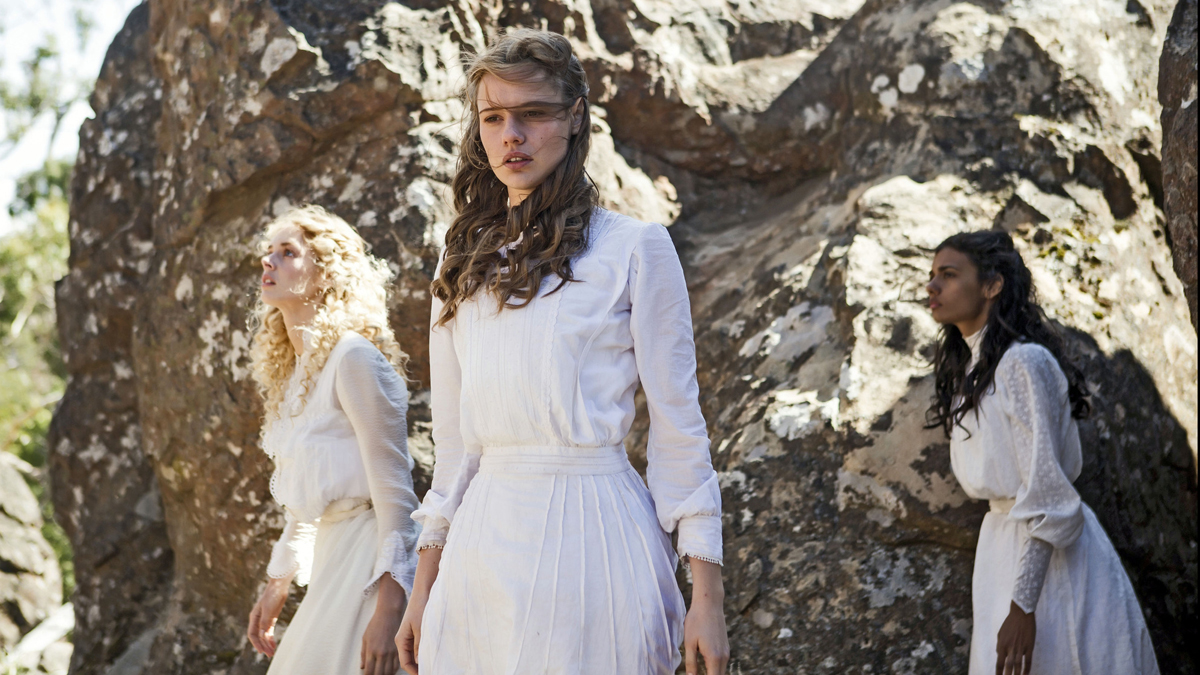
“We all,” Dormer looks around the room at her half a dozen interviewers, all women save for one man, “all but one” she corrects with a laugh, “—you gentlemen have your own version of it—can remember what it is to be an adolescent girl grappling with puberty and the intensity of the bodily changes and the emotional changes… if you put young pubescent girls, with their hormones going everywhere, in a contained space, that is the reality of the situation.”
Dormer is keen not to put too much significance on Picnic At Hanging Rock being led by writers and directors who are women. On the press circuit for the show here in the UK, in the US and Australia, the focus on its gender provenance has obviously become something of an irritant.
“Hopefully we won’t need to talk about it so much in the future,” she says. “Hopefully, in ten years’ time this will all be so much more irrelevant because it will naturally be happening that the parity, the equality of stories that we see, the gender in front and behind the camera, sexuality, ethnicity…” she trails off.
The problem, she explains with a sigh, is that she doesn’t want to give sweeping statements that could do a disservice to the men who worked on the projects, or alienate potential viewers. “We had incredible [Heads of Department] that were male, our cinematographers were both male, old-school male, males in their sixties, like Garry Phillips. He was our cinematographer and then for our second block was David Eggby, who shot the first Mad Max, for god’s sake—the testosterone-driven, original Mel Gibson Mad Max.
“Katheryn Bigelow can make Point Break. Okay? Michael Rymer, is one of our male directors, can make Picnic At Hanging Rock,” she says. “There is a statement of tone made at the beginning that yes, on this occasion, came from Beatrix Christian and Larysa Kondracki which is therefore—they can’t help it, they’ve got vaginas, they’re female, so by osmosis, they give an energy—but ultimately, good storytelling to me is genderless.
“If I can sit down and watch a hardcore Vietnam War film and enjoy it, then I expect my brother or my best male friends to be able to sit down and enjoy Picnic.”
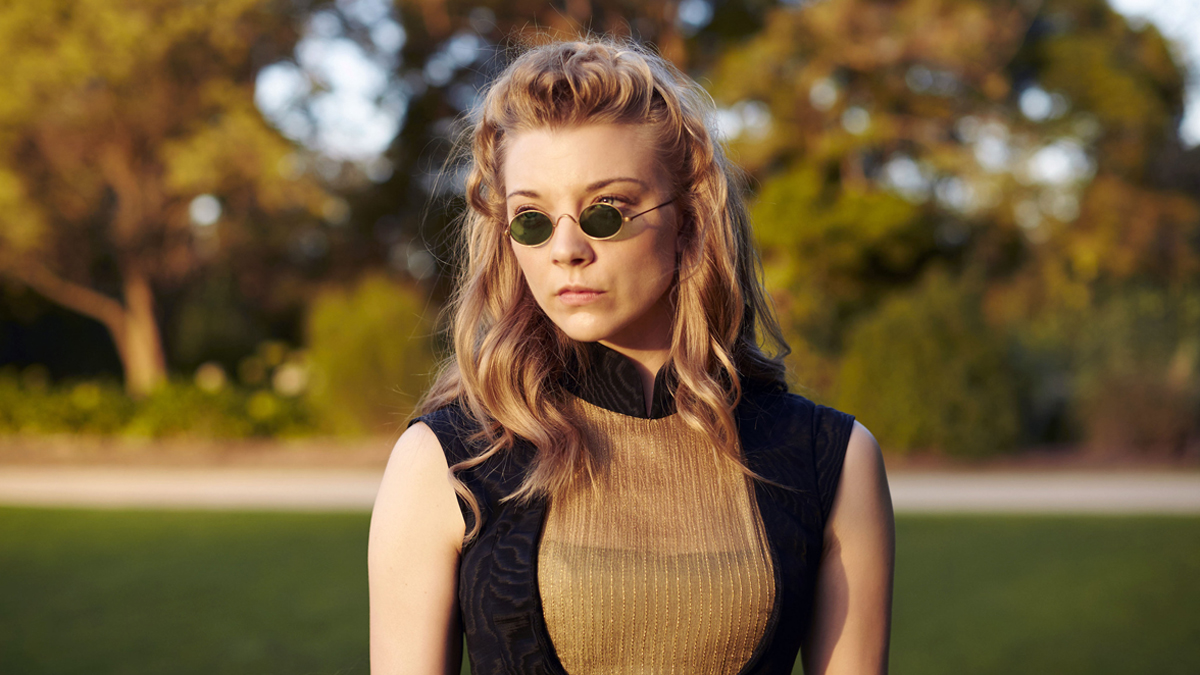
In Picnic At Hanging Rock, Dormer plays a revised version of Mrs Appleyard, the headmistress of private girl’s boarding school Appleyard College. Her character is much younger than the original (played by a 48-year-old Rachel Roberts in the acclaimed 1975 Peter Weir film adaptation), and has an expanded backstory.
Every character’s backstory has been expanded for the TV series. The original novel, which Dormer was surprised to discover after reading the early scripts to be fairly short (“it’s only two hundred pages”), was begging to be fleshed out, she tells us.
Writer Beatrix Christian was able to fully expand “all the clues and subtext that Joan Lindsay leaves” in the book. In that way, the series “remains true to the spirit of Joan. When you re-read the novel, you see that she nods and winks to the things that Bea has just run with. I genuinely believe that cinephiles of the Peter Weir film and lovers of the book will not feel violated,” Dormer says.
Hester Appleyard is by no means the hero of Picnic At Hanging Rock. In her jewel-coloured gowns and Victorian sunglasses (nicknamed by Dormer her “Gary Oldman glasses”), she could well be seen as its villain. She’s a tyrant and a bully, says Dormer, “who I’m not a fan of, obviously” but we learn that the character has her own justification for treating her pupils as she does. “What she really thinks she’s giving is tough love to the girls,” says Dormer. “Else she’s a psychopath, which she isn’t.”
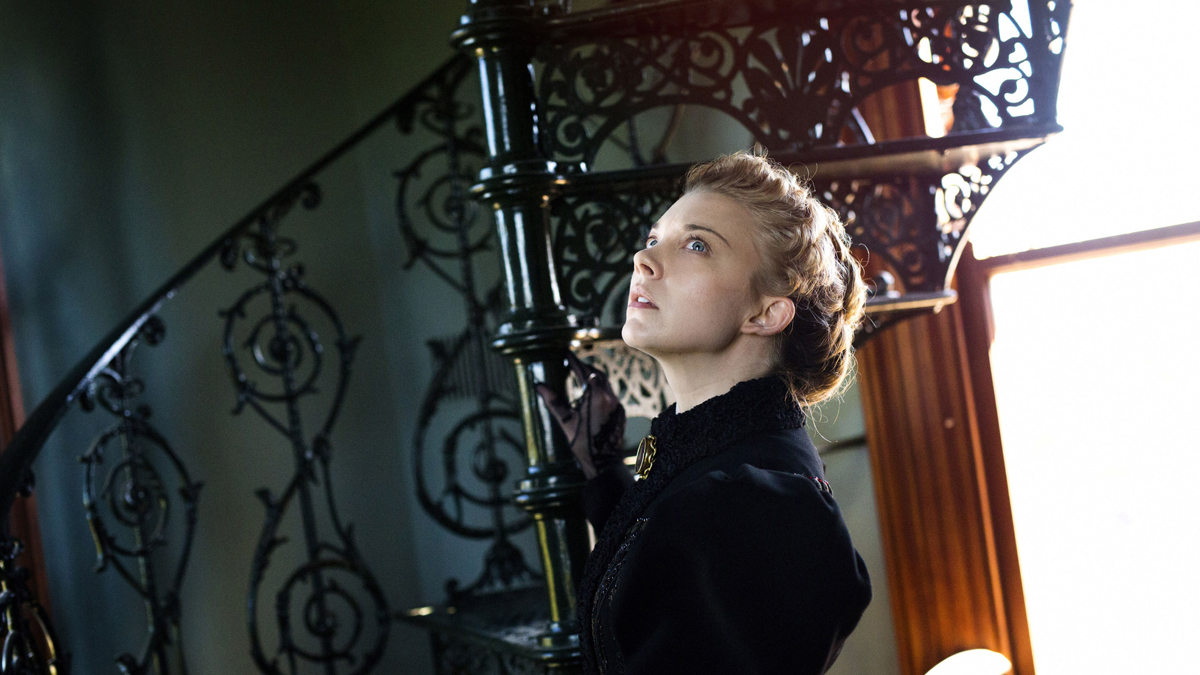
It was like playing “two characters for the price of one,” says Dormer. “You have to dig deep into the humanity of Hester. Hester, not Appleyard, and understand where she’s come from.”
Originally from England, Hester ends up in rural south Australia, during the summertime. For a woman in 1900, that was no joke. “You would have thought that the revolution would have happened sooner, you really would,” says Dormer, shaking her head. “All across the Empire, be it India, Africa, Australia… if you put three layers of petticoat on and a corset and stand in forty degree heat. I don’t know how women did it.”
Dormer and co. did it by “straddling fans and throwing water over ourselves”, she laughs. “I suppose [women] wore it as a badge of honour. They had no other choice. That’s what you do when something is enforced on you – you claim it. Which is kind of the message that Hester Appleyard is trying to give the girls.
“She’s preaching an antiquated idea of how to be independently spirited within the confines of a patriarchal society,” Dormer explains, “whereas the young girls are at the turn of the century, where they can smell emancipation and are more radical in their thoughts. It’s not that she’s trying to stamp them down, but she’s broken and doesn’t believe that it’s possible. And I mean, that’s relevant to today, as much as it was in the sixties when Joan wrote the book, as much as it was in 1900.”
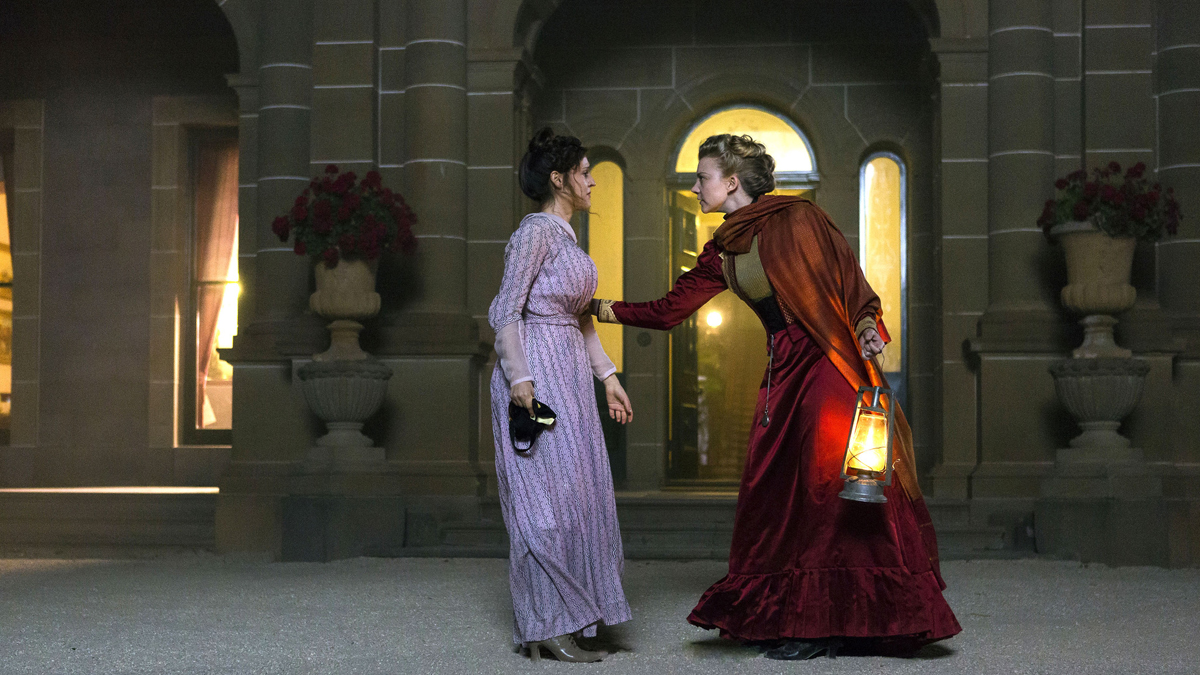
Viewers can rely on being told a complete story with Picnic At Hanging Rock, Dormer assures. It’s a finite six hours, with no designs on returning for a second season. “You know there’s going to be a beginning, a middle and an end, so you don’t get in that nebulous area of ‘are we being picked up?’ ‘where do we leave these character strands?’” she says. “There is a beauty in the discipline of knowing that you have got a three-act structure in six acts.”
While the novel framed its fictional story as historical fact, anchoring events in documents and letters that purport to be real, the television adaptation, says Dormer, takes a different tack. There are “psychedelic elements, surreal elements, magical realism… it lends itself more to the supernatural or sci-fi,” she says. “We may be wearing corsets and there may be horses, but it feels more experimental in its tone.”
Whether or not the TV series is set in our world or in another is down to interpretation, says Dormer. “That’s for you to answer, not me,” she laughs. “Larysa calls it ‘choose your own adventure’. You can legitimately believe that something very physical and matter-of-fact and horrific happened to the missing girls, or you can lean into a more magical, supernatural explanation.”
Modern TV viewers are sophisticated enough to deal with narrative uncertainties, Dormer suggests. “I think we spoon feed our audiences too much. They know.” In many ways the story is, like the novel, open to interpretation, though, says Dormer, “we have an emotional conclusion.”
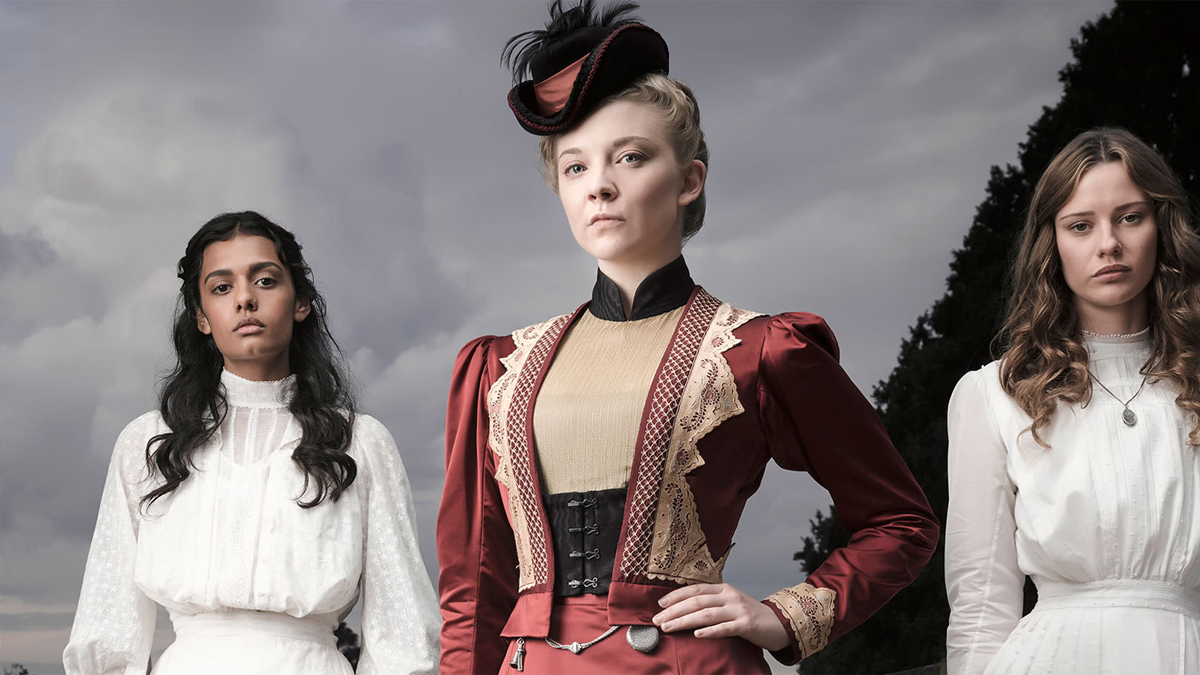
In terms of genre, Picnic At Hanging Rock “refuses to be contained” says Dormer. “Larysa calls it ‘an enchanted thriller’ but,” she lists on her fingers, “it has elements of psychological thriller, verging maybe even on horror in some places, there’s really strong comedy in places. There’s romance in there, there’s adventure, there is a mystery that fundamentally is the anchor of the story.” The six hour series has “this ability to morph as you watch it,” she says.
Visually, the series pays homage to the work of several artists and photographers and filmmakers. Stanley Kubrick and David Lynch have both been cited as an influence in reviews (the series has already aired in Australia). “The Virgin Suicides was definitely a reference,” says Dormer. Larysa Kondracki had a two hundred page ‘look book’, Dormer explains. “She had a very strong image of the tone and the bold statement she was going to make in the visual grammar.” The heightened style of the episodes helps to sell some of the story’s stranger aspects.
Kondracki “very savvily” offered up “a bottle of wine to anyone who came up with the wackiest idea that ended up on camera,” says Dormer. “She ended up giving out a load!”
Did Dormer receive a bottle or two? “No! But not because I didn’t come up with any ideas! Good point,” she laughs, “she owes me wine!”
Picnic At Hanging Rock starts on BBC Two at 9.05pm tonight, Wednesday the 11thof July.